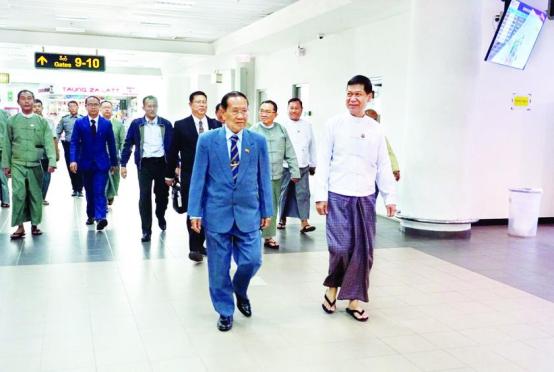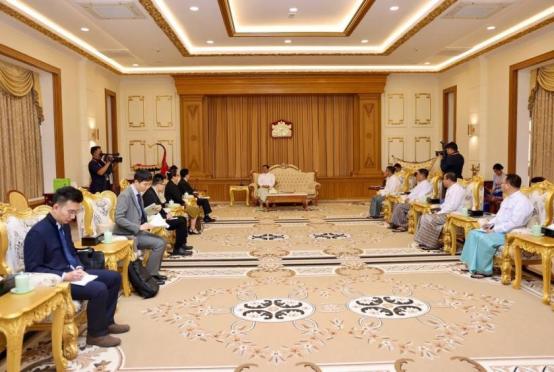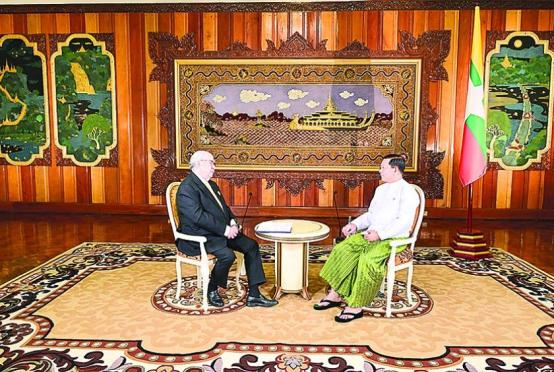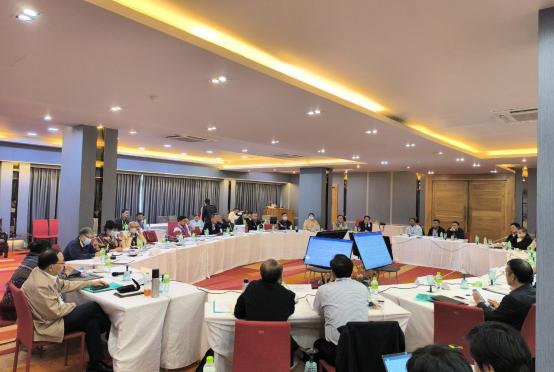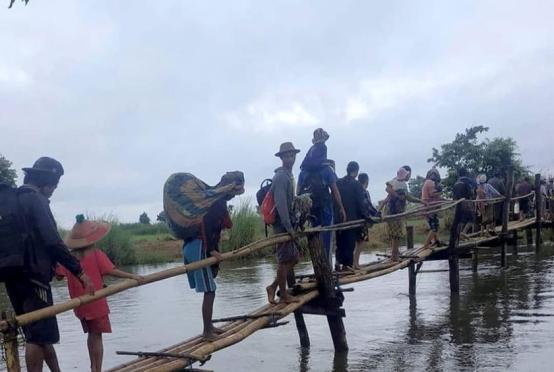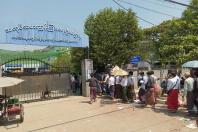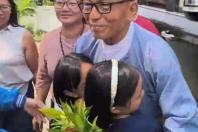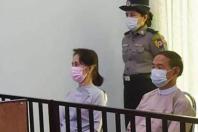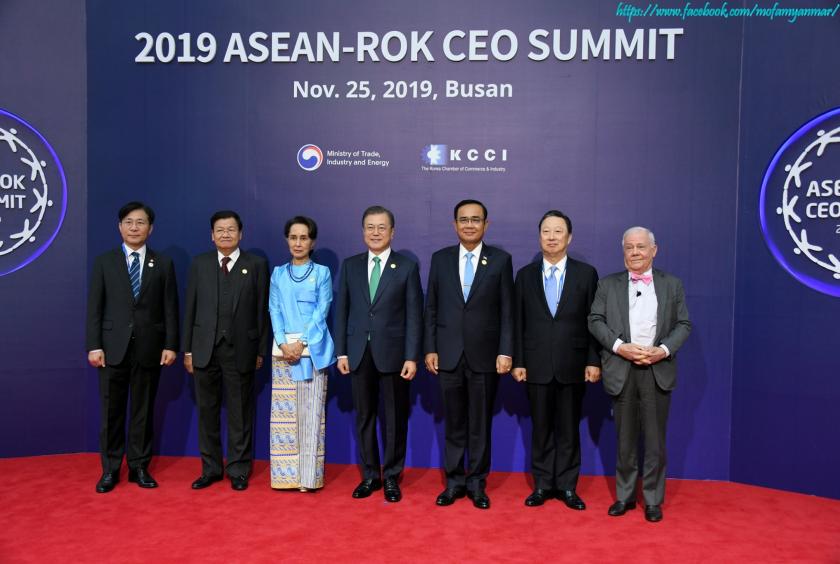
Myanmar’s economy grows between six and seven per cent annually, Myanmar is also amongst ASEAN’s fastest-growing economies, said State Counsellor Daw Aung San Suu Kyi.
The remarks came from the speech of State Counsellor Daw Aung San Suu Kyi delivered at the ASEAN-ROK Culture Innovation Summit and ASEAN-ROK CEO Summit (Session-3) in Busan, the Republic of Korea on November 25.
State Counsellor Aung San Suu Kyi attended the opening ceremony of the ASEAN-ROK CEO Summit where she delivered keynote speech at the ASEAN-ROK Culture Innovation Summit and ASEAN-ROK CEO Summit (Session-3) in Busan, the Republic of Korea.
It gives me great pleasure to be with you at today’s ASEAN-Republic of Korea CEO Summit, here in the bustling port city of Busan, said Daw Aung San Suu Kyi.
I would like to take this opportunity to thank His Excellency, Moon Jae-in, President of the Republic of Korea, for inviting us to participate in this event, and also for his recent visit to Myanmar, which brought our two countries closer together than ever, said Daw Aung San Suu Kyi.
President Moon has been a tireless supporter of a stronger, more prosperous, and more holistic ASEAN-Korea relationship, a relationship bound by economic and business ties, inspired by people-to-people connections, and emboldened by our unique sense of ASEAN solidarity, said Daw Aung San Suu Kyi.
Both President Moon and I have spoken often of our wish to nurture this relationship, which will include creating new and ambitious win-win partnerships with those of us who hail from the Mekong region, said Daw Aung San Suu Kyi.
We in Myanmar place much value on such win-win partnerships and are eager to work together to further the co-prosperity of our nations and our region. This view has been most clearly articulated within our new Myanmar Sustainable Development Plan.
I believe we can find much in common between Korea’s own New Southern Policy and our own Sustainable Development Plan, two plans united in shared intent, that is to unleash freedom and prosperity for our people and our region, said Aung San Suu Kyi.
“Today’s summit takes place as we celebrate the 30th anniversary of the special bond between Korea and the countries of ASEAN. Our countries understand all too well that development results are hard won, and yet what we have achieved together in just one generation is truly remarkable. That is why Myanmar has always, and will continue to, welcome Korea’s support for the achievement of our development ambitions.
“Most importantly, this summit provides us with an opportunity to connect the dots between areas where progress has been made, and those where challenges remain. In today’s interconnected world, we must avoid the tendency to address development issues in isolation. Solutions must be comprehensive, integrated and coordinated. From climate change to energy security, from food security to human development, addressing development challenges via partnerships offers the greatest chance of sustainable success,” said Daw Aung San Suu Kyi
“Myanmar today is seeking to expand its investment and trading relationships, with a specific, but not exclusionary, focus on relationships with the rising economies of ASEAN, and Asia, more broadly. The largest country in mainland South-East Asia, Myanmar is home to 53 million people, a majority of whom are of productive working age.
“Growing between six and seven per cent annually, Myanmar is also amongst ASEAN’s fastest-growing economies. We offer a strategic land bridge that connects our region's two largest trans-national economies: the Greater Mekong Sub-region and the South Asia Sub-region.
“With some 17 trillion cubic meters of natural gas, 3.2 billion barrels of crude oil, rare elements, metallic minerals and gemstones, and a vast range of agriculture and aquaculture products we are also resource rich,” said Daw Aung San Suu Kyi.
“We bring a range of complementary strengths vis-à-vis the Republic of Korea. However, to fully realize the peaceful, prosperous future to which we all aspire, we seek new business partnerships through which co-prosperity may spread. Enhancing bilateral economic cooperation in this way requires not only the strengthening of business-to-business and people-to-people relationships, but also much greater attention to the institutional infrastructure and legal frameworks that underpin these relationships and allow them to flourish.This is why we in Myanmar are fully committed to concluding the Regional Comprehensive Economic Partnership (RCEP) negotiations as early as possible,” said Daw Aung San Suu Kyi.
“Trade flows between Korea and ASEAN have increased twentyfold since formal relations were established, and over time we have become Korea’s second-largest trade partner. Myanmar has no doubt benefitted, with our industry sector expanding rapidly in recent years (23.9% of GDP in 2017 compared with 19.7% in 2011).
“This growth has been boosted by increased manufacturing output (supported by strong growth in garment exports) and construction sector growth with the start of many new strategic infrastructure projects, including the Myanmar–Korea Friendship Bridge to Dala, and the newly opened Korea-Myanmar Industrial Complex.
“Myanmar’s re-integration into the global economy presents us with a unique opportunity to leverage new partnerships in ways that reduce poverty, to promote shared prosperity, and to continue our pursuit of peace,” said Daw Aung San Suu Kyi.
Edited by WH

